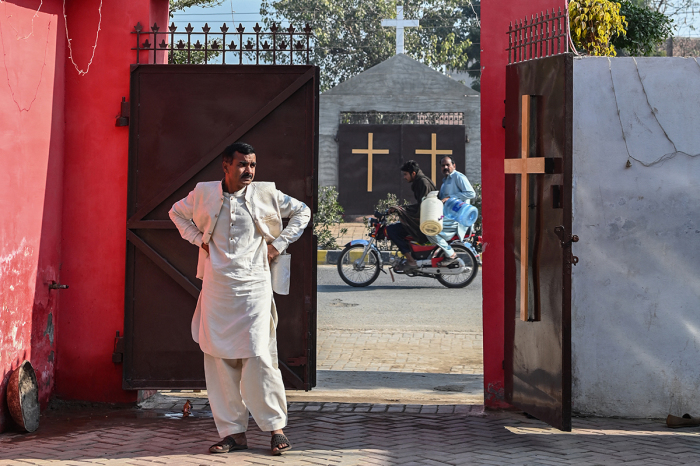
The recent arrest of a mentally disabled Christian waste collector in Lahore is driving renewed awareness of how Pakistan’s controversial blasphemy laws continue to disproportionately target the country’s most vulnerable populations — religious minorities, the poor and people with disabilities.
Zafar Iqbal Masih, who collects recyclables from the streets for a living, was arrested on Nov. 2 following mob violence triggered by accusations that he burned pages of the Quran.
The case adds to a growing pattern of blasphemy accusations against Pakistan’s marginalized communities, particularly those at the intersection of poverty, disability and religious minority status.
The incident began when Masih, who has an undisclosed mental disability, was sorting his daily collection of recyclables — a common occupation among Pakistan’s poorest citizens. His wife, Rubina, describes how a routine task of burning unsellable waste escalated into a dangerous confrontation when a neighbor accused him of burning religious texts.
“Zafar is an innocent man. Because of his mental illness and his illiteracy, there is no way he could do a blasphemous act,” Rubina told GCR.
She detailed how her husband’s mental health had deteriorated over their 13-year marriage, further limiting his already modest earning capacity as a waste collector.
The accusation quickly drew an angry mob, highlighting the volatile intersection of religious sensitivities and social vulnerability.
“Within minutes, members of the neighborhood gathered and started chanting religious slogans. They broke into our house and started beating Zafar,” Rubina recounted, describing how the mob dragged her husband into the street and pelted him with stones before police intervention.
The case mirrors numerous similar incidents where Pakistan’s blasphemy laws have been wielded against society’s most vulnerable.
In June 2024, 60-year-old Jamila Jacob, a mentally disabled woman, was jailed rather than receiving medical treatment after facing blasphemy charges. She is still awaiting justice.
In 2012, 14-year-old Rimsha Masih, a girl with intellectual disabilities, faced similar accusations before her case was eventually dismissed.
Christian journalist and social activist Saleem Iqbal reported that the incident has sparked wider community tensions, forcing local Christians — already among the city’s most marginalized groups — into hiding.
“When I reached the scene, homes were locked and all the Christians in the area were nowhere to be found. The extremists of the Muslim community were roaming the streets and chanting slogans filled with threats for Zafar and other Christians,” he said.
According to the police report, Qari Mujahid Abbas, chief of the local Noorani Mosque, filed the complaint leading to Masih’s arrest under Section 295B of Pakistan’s Anti-Blasphemy Law. Critics have long argued that these laws are systematically misused to settle personal scores or target minority communities, with the poor and disabled being particularly vulnerable to false accusations.
Masih’s attorney, Dr. Sharjeel Zafar, emphasized the discriminatory nature of Pakistan’s blasphemy laws while noting that requests for his client’s hospital treatment have gone unanswered.
“It’s a sad reality that the religious minorities of Pakistan are suffering from discriminatory laws like blasphemy,” he said.
Masih remains in a special cell awaiting further legal proceedings.
The case has renewed calls for reform of Pakistan’s blasphemy laws, which human rights organizations say create a dangerous environment for the country’s most vulnerable populations, particularly those who face multiple layers of social marginalization through poverty, disability and religious minority status.
Nasir Jamil is a writer for Christian Daily International, which provides biblical, factual and personal news, stories and perspectives from every region, focusing on religious freedom, holistic mission and other issues relevant for the global Church today.








